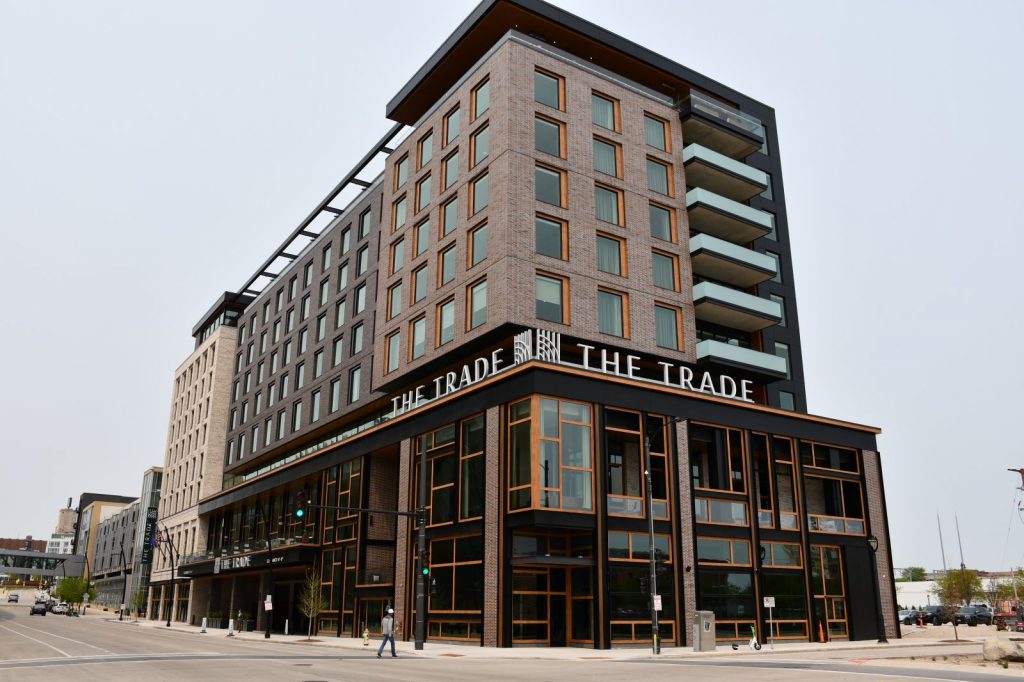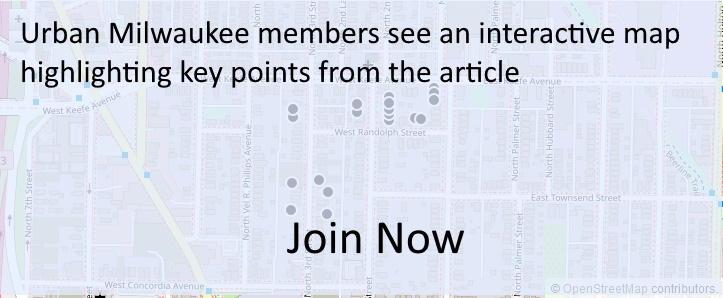Union Describes ‘Pervasive’ Union Busting Campaign at Trade Hotel
Union election remains unresolved pending investigation of company's tactics.

The Trade Hotel. Photo take May 13, 2023 by Jeramey Jannene.
Nearly a year ago, employees of The Trade Hotel participated in election deciding whether or not they would be represented by a union. They lost. At least, that’s how it looks on paper.
The final tally showed most of the votes went against the union. However, the actual election results are uncertain. Workers were organizing with the Milwaukee Area Service and Hospitality Workers Organization (MASH), which has filed a number of unfair labor practices charges, as well as objections to the conduct of the election. Those investigations remain open and, consequently, the results of the election remain pending.
MASH President Peter Rickman charges that NCG Hospitality, which operates The Trade, engaged in a “pervasive” and “disgusting” union campaign that spoiled any possibility of a fair election.
A representative of NCG Hospitality declined a request for an interview regarding the union campaign. Instead, the hospitality company issued a statement describing the election as “free and fair” and calling the union’s unfair labor practice allegations “wholly without merit.”
Elisha Johnson, a server at Craft, the restaurant in The Trade, told Urban Milwaukee that, before her co-workers started organizing with MASH, things weren’t going well at work. She was being treated poorly at work by her manager, she said. She was often disrespected, or reprimanded in front of colleagues. When she went to HR, instead of help, she was asked why she didn’t just quit.
“Nobody had my back,” she said. “I wasn’t valued as an employee.”
All of that changed when her co-workers started organizing. “All of a sudden, [management] was starting to be nice to me again,” she said. This change in disposition, Johnson would eventually come to understand, was part of a larger effort by hotel management to thwart the union campaign.
Johnson was treated to “deceptive pressure,” as she put it, “conniving, misleading” messaging meant to convince her that she would be better off without a union.
Suddenly, there were employee appreciation days, and parties and complimentary snacks handed out to workers. There was talk of how great the benefits are; how expensive union dues will be; how the union can’t guarantee the workplace will improve; how it might even get worse.
“I thought it was a bunch of malarkey,” Johnson said.
Throughout the union campaign, management made it clear that the company opposed the union, couching opposition in statements about employees’ rights to form or not to form a union. Interviews with representatives of MASH and current and former The Trade Hotel employees paint a picture of intimidation, surveillance and interference that ran up to and through the NLRB-election.
“NCG Hospitality ran a comprehensive campaign of union busting calculated and intended to weaponize the NLRB process to not just oppose formation of the union, but do everything to prevent it, through means both lawful and unlawful,” Rickman charged.
The 205-room hotel is a legacy of the public financing deal between state and local government and the Milwaukee Bucks to create Deer District and build Fiserv Forum. The hotel sits on a parcel that was part of the Park East freeway land, sold to the the Bucks organization so it could build its entertainment district. The Bucks still own the land and NCG Hospitality developed the hotel with a long-term ground lease.
NCG is currently seeking a zoning change from the Milwaukee Common Council for a parcel at 430 W. State St. to develop a seven-story, 156-room hotel called Moxy Hotel. A hearing is scheduled is for Tuesday, May 6.
Not long after The Trade Hotel opened its doors, Justin Otto, a hospitality industry veteran, took a job at the trade in the banquets department. Otto helped organize the union at Pabst Theater Group properties, and he became one of the leading, and most visible, union organizers at The Trade.
The union went public on May 17, 2024, demanding recognition from NCG. The company made their position on the union clear, responding immediately with a letter to employees pushing back against unionization, attempting to sow doubt about what a union can and cannot deliver in the workplace. When the union posted a response on a bulletin board, management allegedly pulled it down.
At a certain point, Otto’s name stopped appearing on the schedule.
“I did not get scheduled for a single shift from the time that management knew about the union until after the election was held,” Otto told Urban Milwaukee.
Otto believes management was making an example out of him, as well as trying to limit his ability to interact with and organize his co-workers. He wasn’t the only one either. MASH has documented other instances of employees falling out of favor with hotel management after supporting the union.
Management also started holding meetings with employees to push back against the union. Johnson recalls a meeting billed as a “Marriott training meeting” that seemed to primarily be about the union, and which seemed to her like an attempt to cast the union in a negative light.
Johnson’s sense of that meeting’s purpose is backed up, in part, by the effect they had on some of her co-workers. After one meeting, two housekeepers reached out to union organizers, telling them management had informed them they would receive a pay cut or the same pay they already have if the union was successful, according to unfair labor practice charges MASH has documented and filed with the NLRB.
“I signed up [for the union] with good intentions not bad ones .. but now I am not sure about it because I can’t not afford to take a pay cut from what I am already making is Pennies,” one of the housekeepers texted.
Beyond the meetings, a sense that management was watching, and listening, for union activities began to pervade daily activity.
Otto believes hotel management was using the hotel’s security cameras to surveil him and his co-workers, watching for potential union activity. Once Otto was unable to organize at work, having been left off the schedule, he had to engage in union activity on his own time, which is legally protected activity.
In one instance, Otto parked his car outside of the hotel to drop off some union authorization cards for a co-worker. A manager came tearing out of the hotel “like a bat out of hell,” Otto said, threatening to call security.
Left off the schedule, and unable to approach the hotel under management’s watchful eye, Otto rented a room at The Trade. The idea was that he would hang out for a few days and stay in contact with his co-workers. Two managers, including hotel General Manager, Rich Lundt, stood outside of his hotel room for 45 minutes, Otto said, “and just basically, like, smoked me out.”
Numerous NLRB rulings have underscored that it is unlawful to surveil employee union activities, or even give them the impression that you are surveilling them.
Once again, housekeepers alerted organizers to the rising fear that they would face retaliation for working with the union, according to documents MASH filed with the NLRB. One texted organizers saying management “caught” people organizing, adding, “Pull my name I will not be apart of it anymore thank you I am not finna lose my job for that I have a child to raise.”
One former Trade Hotel worker who supported the union described being offered a pay raise on the condition that, first, they quit their job for two weeks during the NLRB election. The worker spoke to Urban Milwaukee on the condition that they remain anonymous. The worker is interested in returning to the Trade if the union is ever recognized, but is concerned about retaliation for speaking out publicly.
The worker needed the raise and thus agreed to quit for the two weeks, and was unable to vote in the union election.
There was a sense that management was trying to figure out who was a union supporter and who wasn’t, Otto said. On the day of the election, many union supporters were not scheduled for work.
“They said, ‘I know that if I come in to vote, the company knows for sure that I am doing this because I’m voting for a union, and then they can turn around and retaliate against me for whatever else,'” Rickman said.
Less than two days before the election, management held a final meeting. NCG Chief Operating Office Eric Rottier showed up at a mandatory, pre-shift meeting and, according to union documentation of unfair labor practices, allegedly told employees that NCG “did not support the union” and that “the union would not change anything.” MASH charges this was an unlawful statement about the “futility” of unions.
The next day Lundt sent an email to employees telling them a union would “restrict our ability to reward good performance.” MASH charges Lundt’s email violates federal labor laws against mass speeches from management to workers in the 24-hours before an election.
“The employer controls people’s livelihood,” Rickman said. “It’s inherently coercive.”
On election day, June 27, 2024, the interference continued, according to MASH. A supervisor brought a group of Spanish-speaking housekeepers to the polling location and spoke to them outside, in what union charges was an example of electioneering, Rickman said. The supervisor even attempted to vote in the election, he said, but was turned away by an NLRB agent.
NCG also tried to include other supervisors in the proposed bargaining unit, defrauding both the NLRB and corrupting the results of the election, MASH has charged in an election objection.
When the voting wrapped, fewer than 60% of eligible voters actually cast a ballot. Of the 100 employees in the proposed bargaining unit, only 19 cast a vote for the union and 37 voted against it. A little over a month earlier, the union had pressed management for recognition with a majority of employees in the bargaining unit having signed authorization cards.
Months after the election, Otto was finally put back on the schedule. On his first day back, according to a union document detailing unfair labor proactices, a new employee approached him and if he was the person “everyone talks about…They cut your hours and treated you shitty for starting the union?”
For Elisha Johnson, the poor treatment from management resumed. They started scheduling her less and less, forcing her to look for other work, she said. It seems like they want her to resign. But she won’t give them the satisfaction, she said.
The people running The Trade Hotel know their employees desperately need their jobs, and use this to exploit them, Johnson said. Many, like herself, are living in poverty.
“They know that we rely on the job,” Johnson said. “We will work twice as hard. We will accept so much more… It makes me emotional that these companies have the right to dictate whether or not you’re going to be able to feed your family or have a roof over your head.”

Existing members must be signed in to see the interactive map. Sign in.
If you think stories like this are important, become a member of Urban Milwaukee and help support real, independent journalism. Plus you get some cool added benefits.






















Add this joint to my list of DONT PATRONIZE until they treat their employees fairly. Solidarity with Trade workers!